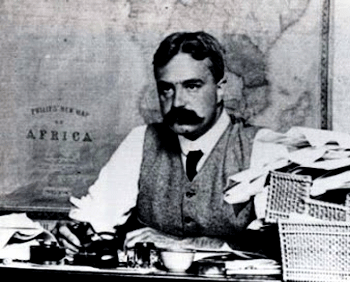A man who helped to bring about the end of a brutal empire, whose tireless campaigning laid the groundwork for groups like Amnesty International, and who defeated Winston Churchill in an election – but who nobody has heard of – surely deserves the accolade “Unsung Hero”. This is why today we celebrate Edmund Dene Morel, who died on this day in 1924.
Morel’s story begins with the invention of the pneumatic tyre, and the ensuing popularity of bicycles – which led to an enormous demand for rubber. That rubber was produced in the Congo, and shipped to Europe. The Congo was at that time known as Congo Free State, and was effectively King Leopold’s of Belgium’s personal property, which he ruled with his own private army.
Morel was a shipping clerk in Liverpool. Having emigrated to England from France in his childhood, his fluency in French meant he was employed extensively in the Congo. Morel noticed that the ships were travelling from the Congo to Europe laden with rubber, but making the return voyage filled with soldiers and firearms – instruments that enforced a brutally unequal exchange.
Morel was outraged. He realised that the discrepancy meant forced labour and the theft of natural resources. Workers that failed to make quota faced having their hands amputated; rape, mutilation and murder were commonplace. Indeed, Leopold and his forces are today estimated to have been responsible for the deaths of up to 15 million Congolese.
The authorities tried to bribe Morel, then to coerce him, but he instead resigned from his job and started campaigning tirelessly to “expose and destroy what I knew then to be a legalised infamy… accompanied by unimaginable barbarities and responsible for a vast destruction of human life.”
Morel armed himself with a camera, and brought back graphic images of mutilated children and piles of bodies that countered the official propaganda of the time. He wrote a book, “Red Rubber”, and also founded a newspaper, The West African Mail, which served as vehicles to expose and publicise what was happening. Most significantly, he set up the Congo Reform Association – the first mass human rights campaign. Other high profile people supported the CRA, notably Irish revolutionary and diplomat, Roger Casement, and authors Joseph Conrad and Mark Twain. The tide of public opinion eventually forced other Western governments to bring pressure on Belgium, and in 1908 Leopold sold his stake to the Belgian state at great personal profit. Reform was promised, but the atrocities continued. Morel and his Congo Reform Association continued to agitate for change for another four years.
As the Congo campaign ended, clouds were gathering over Europe. Morel returned to England and was selected as a Liberal Party candidate for the Birkenhead constituency. Concerned about how behind-the-scenes diplomacy was only making matters worse, he formed the Union of Democratic Control. This organisation became the biggest and most effective anti-war movement of the first world war.
Morel was hated by the jingoistic press who did everything they could to smear him. And smear him they did. UDC meetings were frequently disrupted, Morel was physically attacked several times, he was deselected as a parliamentary candidate by his own party, and, finally, arrested on order of the Home Secretary – despite the police being unable to find any evidence of criminality. Morel spent 6 months in Pentonville prison under such harsh conditions that he would never fully recovered from his ordeal.
After the war, Morel was an outspoken critic of the Treaty of Versailles, prophetically warning that its humiliating and restricting terms would lead to another war. He left the Liberal Party and joined the newly formed Independent Labour Party. Selected as a candidate for Dundee, he defeated Winston Churchill to win a seat in the first ever Labour Government. Beating Churchill gave him great pride:
“I look upon Churchill as such a personal force for evil that I would take up the fight against him with a whole heart.”
It was widely expected that Morel would be given the post of foreign secretary, but Ramsay MacDonald took the unusual step of appointing himself to the role. In an attempt to keep him quiet, senior Labour figures nominated him for the 1924 Nobel Peace Prize. Once again, Morel proved to be intractable, speaking out against his party’s policies when he saw them as immoral. His influence led to the British Government recognising the new Communist government of Russia – something that the right wing press seized upon – and Labour in due course lost the next election. Morel retained his seat, but died of a heart attack a couple of weeks later.
In 1946, George Orwell recalled “this heroic but rather forgotten man” – but even the mighty pen of Orwell could not save Morel’s legacy from obscurity. And so, to this forgotten man on the anniversary of his passing, we remember and express our gratitude for his indefatigable efforts to expose gross and rampant abuses that would prove to be such a valuable blueprint for today’s human rights movements.
[Written by Paul Sharp]



8 Responses to 12th November 1924 – the Death of E.D. Morel